Before I even make it into the shop, I’m overwhelmed with frames of masked wrestlers. Luchadores. Every inch of the wall is covered with a portrait of a legend or a Lucha Libre film poster. I look up, and there are more frames on the ceiling. Some are pro wrestlers, and others are locals in San Diego. There are paintings created by customers, one of which is an adaptation of members of the Kiss band as lucha libre wrestlers. A seating booth has been designed to look like a wrestling ring, wrapped in wires with a bell, a suggestion made by a customer.
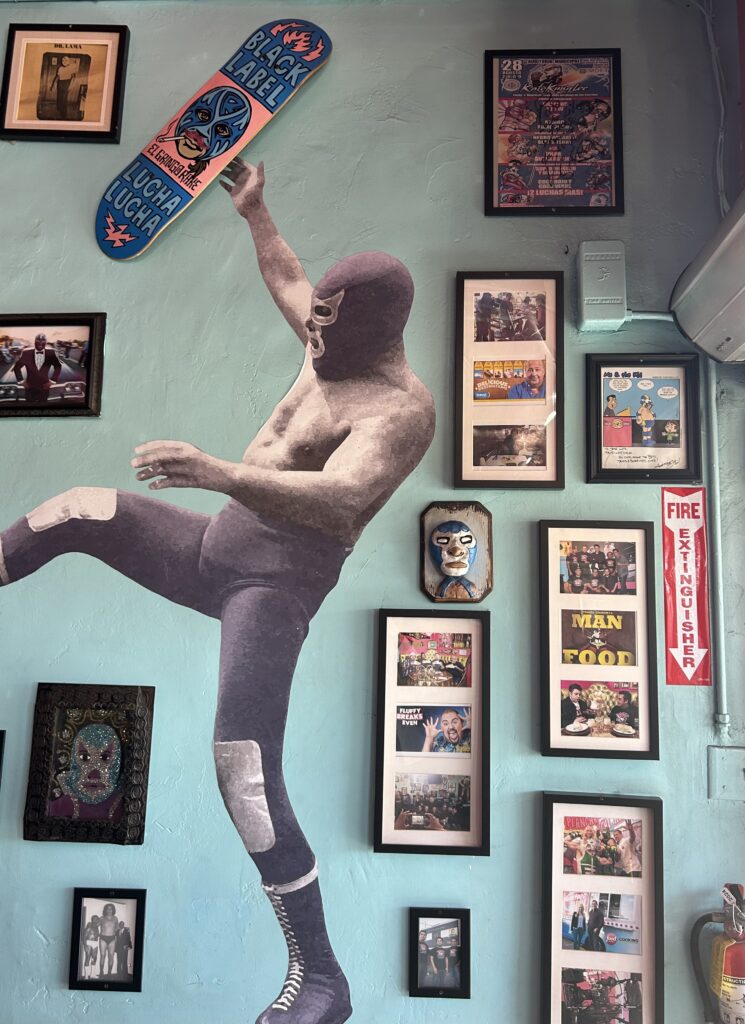
There’s a graphic of a masked wrestler on the wall to the right when you first walk in. The wrestler is posed as if he’s holding the wooden skateboard hanging on the wall. The skateboard was a gift from co-owner José Rojano’s best friend. Almost all of the framed photographs are taken by the same photographer: Daniel Chavira, who has become a good friend of the owners.
“We’re always adding stuff,” Rojano said, showing me around the shop, pointing at his favorite frames. “It’s unbelievable how much stuff we have. We can literally open up a museum.”
Luchadores aren’t supposed to reveal their faces due to them having day jobs, hence the masks. Lucha is a unique style of wrestling, freestyle, originating in Mexico. They are known for acrobatic movements with an emphasis on storytelling and entertainment, often wearing colorful costumes.
Rojano and his brothers, Diego and Maurilio, grew up watching them, but they wanted to show people that there’s more to the Mexican culture than sombreros and mariachi music, he said.
“This is also part of the culture — men in tights and capes and masks,” Rojano said.
The three grew up in the restaurant industry. Their mother ran a Mexican restaurant, and when they had the opportunity with the original Lucha location in Mission Hills, they wanted to give the city a new taste of Mexican culture, Rojano said.
Rojano was born in Mexico City and moved to City Heights in San Diego when he was 5 years old.
Opening a taco shop crept up on him and his brothers, he said. They were each working their separate jobs; Rojano had a catering business, Diego was a music engineer and Maurilio worked for the government. In 2008, when the economy was on a decline, they opened up the shop as a side project, and the city of San Diego seemed to have their backs.
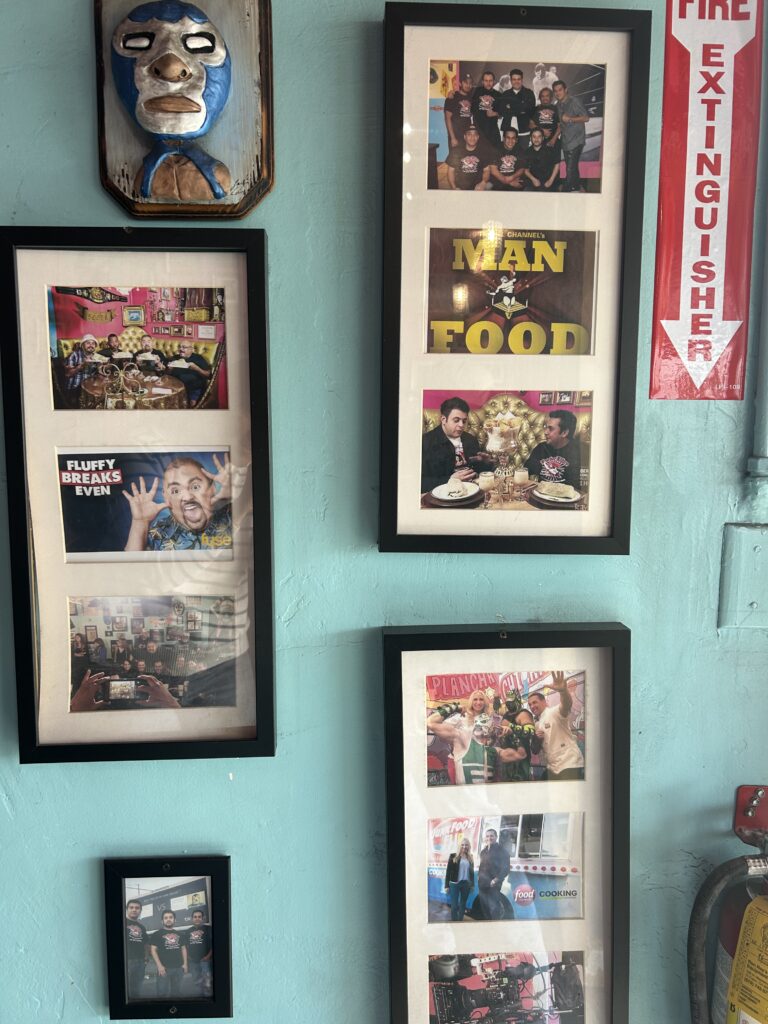
The first time they were featured was in a front page piece by The San Diego Union-Tribune. From there, they were recognized by eight national television shows, including Man v. Food, Fluffy’s Food Adventures and two international ones.
“I never meant to be on TV. I always thought if I was going to be on TV, it would be something like … ‘America’s Most Wanted,’” Rojano said, laughing. “Something like that.”
Since the first location’s opening in 2008, the shop expanded quickly in San Diego with a location in North Park in 2015, three locations in Petco Park, a location at Sycuan Casino in El Cajon, one in Carlsbad in 2019 and finally, Pacific Beach, which opened nearly two years ago.
“In 2008 … the concept of taco shops is very limited,” Rojano said. “They were all cookie cutters; they were all painted yellow and red stripes, and they had the same exact menu. … We wanted to do something different. We wanted to make it fun. We wanted a taco shop where it was still affordable and you still could take a date.”
Due to COVID-19, all locations are closed except for the original in Mission Hills and Pacific Beach. The North Park location closed about six months ago, but Rojano said they’re keeping it to create a space for families and children to come together.
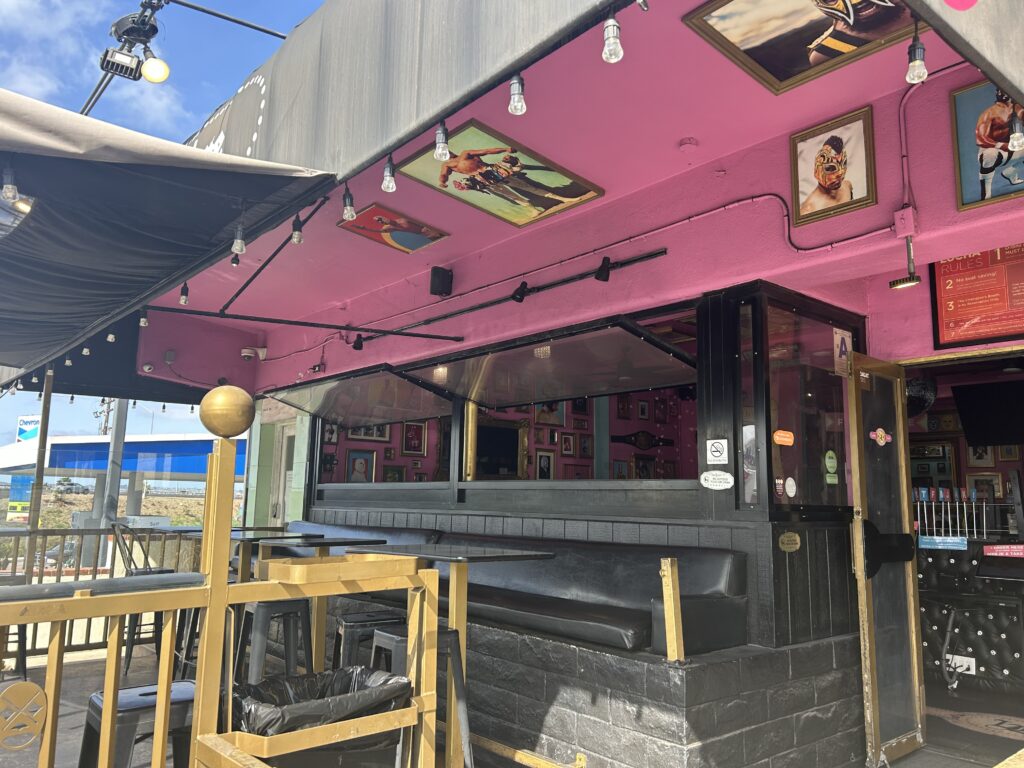
Rojano said he and his brothers had the idea to split Lucha Libre into two concepts during COVID: Lucha on one side and zonkey paletas on the other. In the late 1940s, to make donkeys more visible in the black-and-white photos of the era, donkeys were painted with zebra stripes, creating the “zonkey.” Mexican ice pops, paletas, were doing so well for business that Rojano and his brothers decided to close the Lucha side and expand Zonkey.
“When my brothers and I opened up this restaurant [Lucha], we were single, going out, having a good time and wanted to give San Diego somewhere cool and fun to go hang out and have a burrito,” Rojano said. “Now it’s 16 years later, we’re married; we have kids, and we’re looking at the neighborhood … now all the people that moved there when they were younger, all have families and kids. They’re growing with us, and we saw a need for somewhere parents could take their kids and have a pop.”
With the new space to expand Zonkey, they are creating an event center for kids to have birthday parties and learn how to make paletas. Rojano said it will open in about three to four weeks.
“It’s kind of like a natural progression of our lives mimicking the restaurant,” Rojano said.
There are no plans to expand the business as of now, Rojano said. The focus is on finishing the remodel of Zonkey.
A family business
Rojano and Diego take the helm out of the restaurants, and Maurilio, who is not as involved, takes care of the marketing, Rojano said.
Their mother worked in the kitchen when it first opened. She still helps with the bookkeeping but is semi-retired. She developed their salsa recipes. With each new cook, Rojano encourages them to share their family recipes to continue to evolve their menu.
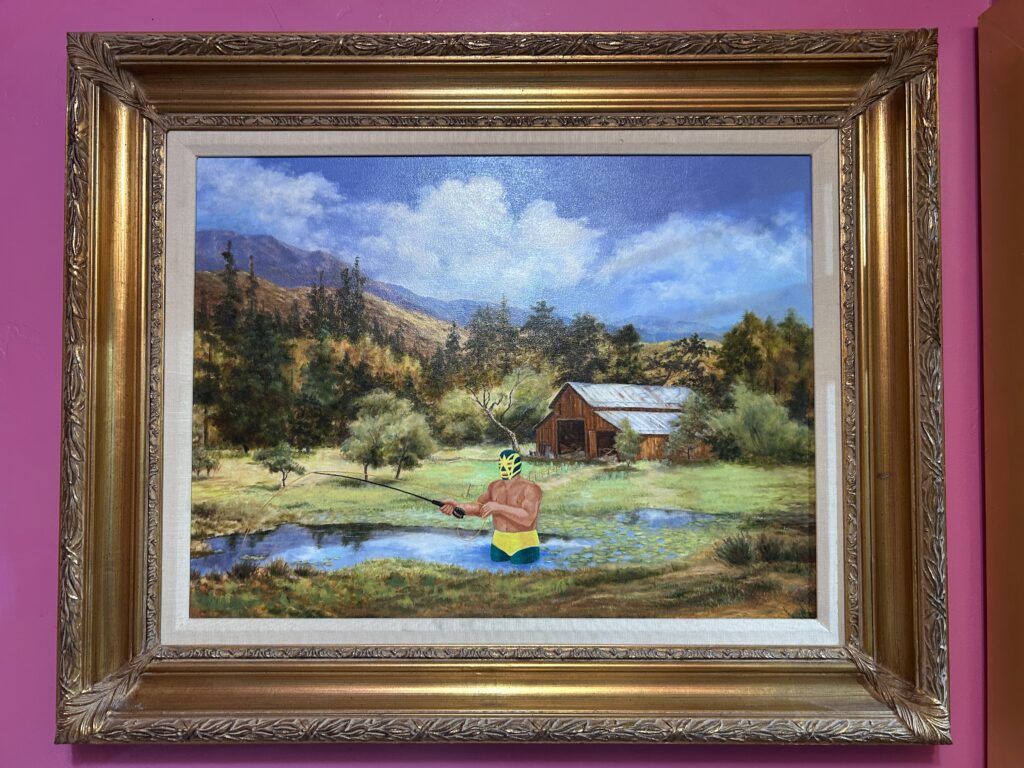
Their father worked in an upholstery shop, repairing furniture with soft, padded textiles covering features. He reworked the shop’s chairs to have a zebra pattern, recognizing the zonkey.
Diego’s wife, Mariya, who is a graphic designer, painted lucha wrestlers or masks into Renaissance paintings, which are hung in the bathroom.
Their cousin is currently the general manager, and his wife is the kitchen supervisor. In the past, other cousins have been managers, and his goddaughter was a cashier.
“Whenever a family member needs a job, they’ve worked here,” Rojano said.
The meaning behind the interior
Rojano said his favorite part of the original location’s interior is the movie posters, which are all originals.
“[In the] ‘50s to the ‘70s, early ‘80s, there was a series of wrestling movies. In the [United] States, there was Superman and the superheroes; wrestlers were the superheroes of Mexico,” Rojano said. “They would go around wrestling Nazis and Dracula and Frankenstein.”
His favorite portrait is of the Blue Demon. Rojano said he’s formed friendships with countless wrestlers, who text or call him when they’re going to come in. One of the masked wrestlers, Pablo, went to Rojano’s wedding.
“We’re really lucky to be able to form these relationships with wrestlers,” Rojano said. “Every Mexican wrestler who knows that if they’re in San Diego or passing through, if they come in … they always eat for free. I always treat them like kings.”
While wrestlers eat for free, customers who wear masks get a 15% discount. They sell merchandise in the shop, from shirts to wrestling masks.
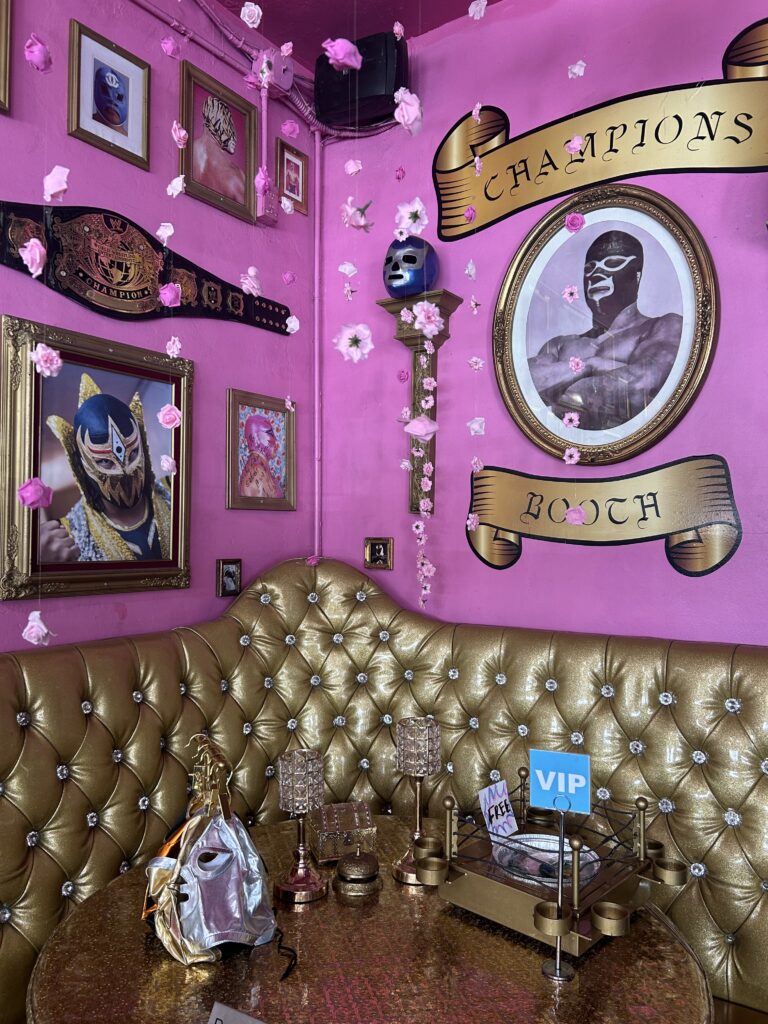
In the corner of the shop is a golden booth – the champion’s booth – with chalesses, masks, gold decorations and a champion’s belt hanging on the wall, which Rojano won on eBay and jokes that he leaves out the eBay part when people ask. It’s VIP seating for champions. To eat in luxury, reservations can be made on their website 24 hours in advance. Customers get waiter service with food served on gold-lined plates and “real silverware,” Rojano said.
The walls of the shop are pink. Rojano said it wasn’t by his choice. When they were preparing to open the shop, they needed to paint the walls, and it was Maurilio and his wife’s job to go get it. They returned with pink and blue.
“I was so mad because I’m like, ‘It’s not a baby shower,’” Rojano said. “And they were like, ‘No, trust us.’ Because pink is very Mexican.”
But it works, and now it’s the iconic look of each location.
The shop’s most popular menu item is the “Surfin’ California” burrito, which was created by Diego and brought national attention, including Man v. Food, because, at the time, french fries in burritos weren’t as popular.
“The California burrito was born in San Diego. We didn’t invent it; we just perfected it,” Rojano said.
Diego said that when he was in the kitchen, he decided to “marry both worlds” of his favorite burrito, the California, and another burrito on the menu, which was similar. The Surfin’ contains fries, avocado, pico de gallo, steak, shrimp and a “secret chipotle sauce.”
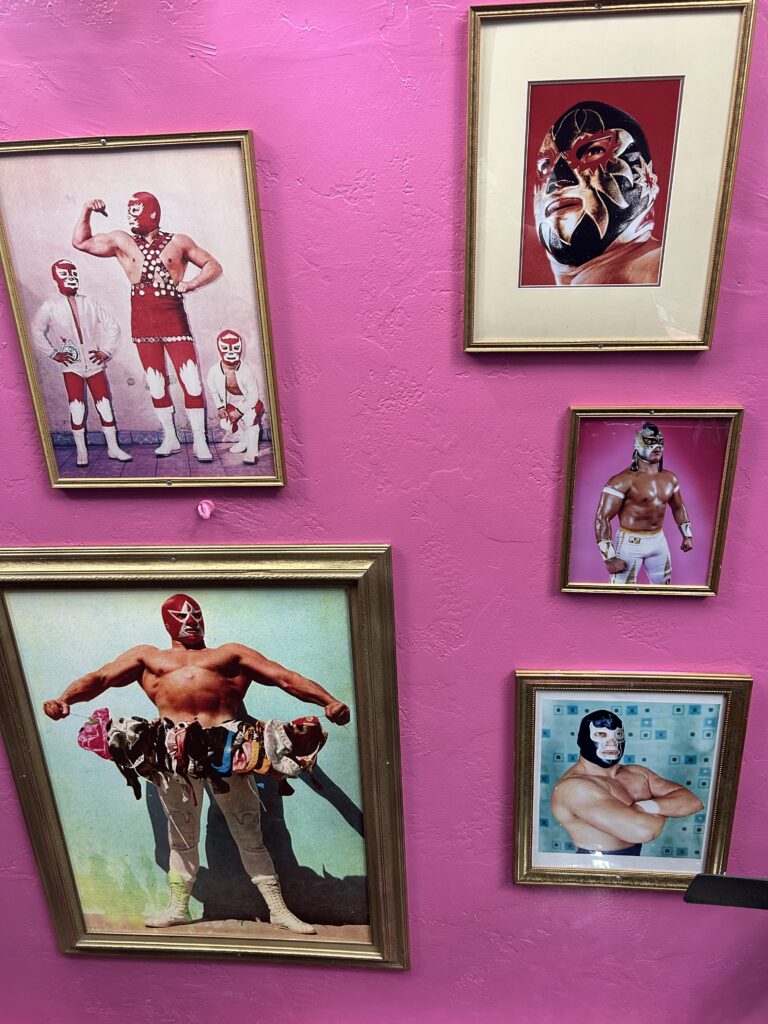
Mini thumb sleeves with wrestler masks come with each meal. Diego purchased them on a Google doom scroll and doesn’t remember where from, he said. He recently bought a 3-D printer to print a wrestling ring for thumbs, which he made.
Diego credits the shop’s social media manager, Henrry Baca, a recent San Diego State University graduate, for the idea. Diego said it’s been Baca’s effort to share more information about the shop’s message.
“A lot of people come into the restaurant and they don’t really know a lot about Lucha Libre or the culture or the history of it,” Diego said. “[We want to] just kind of bring a little bit of the culture and vibe more into the restaurant so people can be more aware of it.”
Things such as photographs, QR codes and NFC tags would be used to share the story of a particular wrestler or the goal of Lucha Libre.
The brand: More than Mexican food
Lucha Libre has amassed a large Instagram following of 18,100, where they post memes, national television collaborations and food content. The social media manager, Baca, who earned his marketing degree from SDSU, handles all of the shop’s social media, including TikTok and Facebook. He said his goal for his posts is to be a reflection of the brand.
“Every time I create something, my purpose is to create something that is going to resonate with my audience,” Baca said. “I want them to feel something that is very relatable. Maybe it’s cultural; maybe it’s funny; maybe it’s nostalgic.”
Baca said that while he was a student, it allowed him to apply what he was learning in real time. Being surrounded by a young generation aided him in staying in touch with what’s trending to connect with a broader audience on social media.
“I want to represent that we are more than a taco shop,” he said. “[But] a place where you can learn about different aspects from Mexican culture.”
Baca started as a cashier at the shop in 2023. He said he noticed their social media presence wasn’t doing very well, so he asked to take over in 2024.
Before then, however, he was traveling the world and working as an accountant. He moved to San Diego in 2019 to get a fresh start. He said his experience with various cultures has helped him in his content creation.
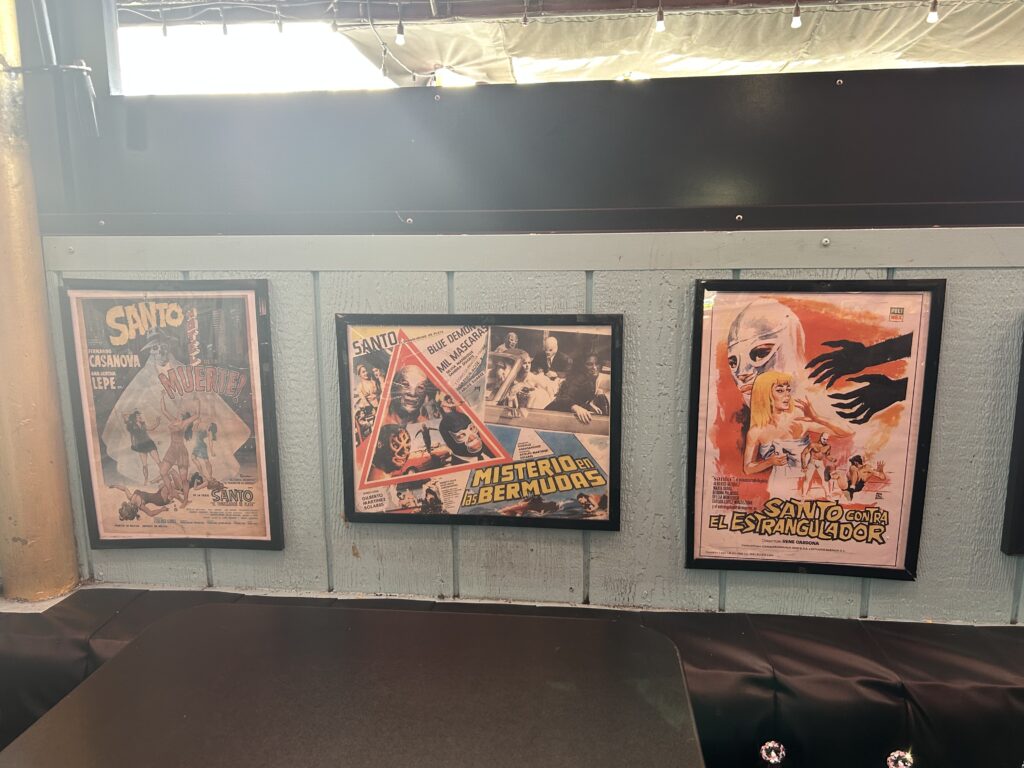
“I want to bring something that [people] are going to feel close to home because it happens to me,” Baca said.
He said that when traveling, sometimes you want to try something that reminds you of home. To cultivate that feeling, Lucha Libre is working on a SmackDown challenge to deliver a different burrito oriented to a different region, including India and Brazil, to bring in those populations within San Diego.
Rojano said a lot of their customers are tourists who come in for the first time. Some come with suitcases, making a pit stop to and from the airport.
“I want them to come in for the decor and all the cool stuff, but I really want them to leave happy with what they ate,” Rojano said.
